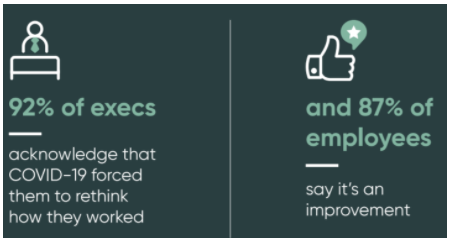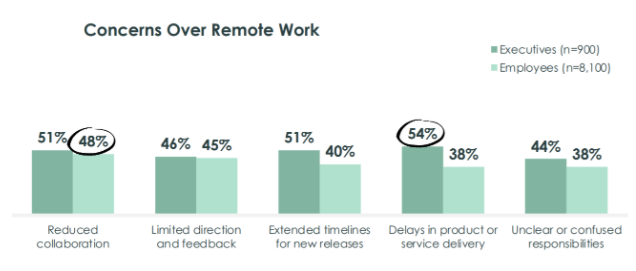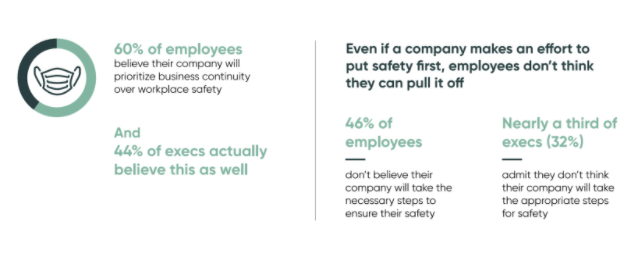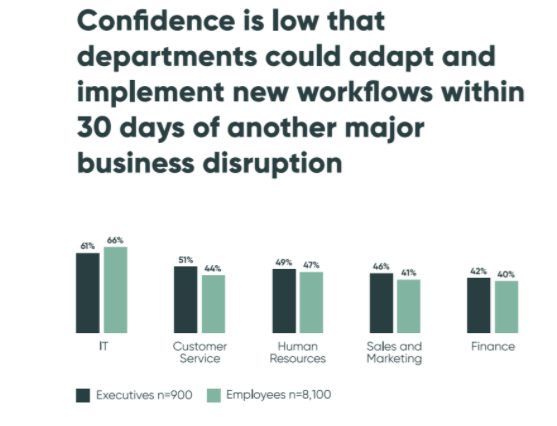ServiceNow releases 'The Work Survey', a comprehensive global report on how COVID-19 has impacted work & people

Yesterday, leading digital workflow platform ServiceNow released The Work Survey, one of the most in-depth overviews of the myriad ways in which COVID-19 has already impacted the world of work. With it’s close examination of employee experience, how technology has enabled a smoother transition to remote work and how digitalisation will continue to accelerate as the pandemic continues, the ServiceNow survey offers a fascinating insight into the complex intersection points of concern, improvement and uncertainty that workers around the world are facing. The ServiceNow survey was fielded by Wakefield Data and features responses from 900 C-suite leaders and 8,100 employees in 11 countries across multiple industries, making it one of the largest and most comprehensive surveys of the work and pandemic landscape so far. Here are some of the key takeaways from this extensive study:
'The Perfect Environment for Innovation'

The survey was conducted in September in the United States, United Kingdom, France, Germany, Ireland, Netherlands, India, Japan, Singapore, Australia, and New Zealand. Overall, executives in all these countries were united in saying COVID-19 had changed their business mindset: 92% of execs “acknowledge that COVID-19 forced them to rethink how they worked.” What’s more, the majority of employees (87%) say this new way of thinking about business is an improvement.
However, when we look at the bigger picture, it becomes a little more complex:
Remote Work - Benefits and Challenges
One of the major changes, of course, is in how widespread remote work has become for many workers. Employees report the following benefits of remote work:
- Time saved from not commuting (54%)
- Better work-life balance (49%)
- Greater flexibility managing personal responsibilities (46%)
There are numerous benefits to remote work, so much so that it could impact retention. Now, 55% of employees say companies must provide flex work, and 47% want guaranteed remote work, otherwise they’ll look for another job elsewhere.
For executives, however, there is significant anxiety around how sustainable remote work will be in the long term. According to the ServiceNow survey, 93% of executives have “real concerns about how remote work will impact the business moving forwards.” There are various sources of concern: for example, over half (54%) of executives are concerned about outputs, such as delays in product or service delivery. 83% of employees are also concerned about remote work, for some of the reasons listed in the below infographic:

When do we return to the workplace - and how?
In a familiar scenario for many of us, both executives and employees are walking the line between concerns over long term remote work and worries over how to facilitate a safe return to the workplace.
When it comes to safety, 60% of employees sadly believe their company would prioritise “business continuity over workplace safety.” This sentiment is actually shared by 44% of executives, indicating just how tricky a dilemma employees and executives are facing when it comes to balancing successful business continuity and employee wellbeing.
Similarly, close to half of employees (46%) don’t believe their company will take the necessary steps to ensure their safety. Whatever the reasons behind this belief, it seems evident employers need to do more to reassure their workers that they will keep them safe if and when they return to the workplace. However, as it stands at the moment, almost a third of executives admit they don’t think their company would take appropriate measures to ensure safety.

Setting 'A New Pace' but concerns about future success remain
The pandemic not only forced an unprecedented level of change on workers, but did so at an incredibly fast pace. According to the survey, 91% of executives and 87% of employees said their company pivoted to new ways of working faster than they thought possible.
While this rate of change is undoubtedly impressive, respondents are less sure they could replicate this transformation should another large-scale global crisis hit. In HR, for example, less than half of executives (49%) and employees (47%) are confident that departments could adapt and implement new workflows within 30 days of another major business disruption. Clearly, it has not all been smooth sailing. Despite the quick transition, companies are still getting to grips with the new reality and will be working hard to continue to adapt for some time to come.

More Digital Transformation Now!
One resounding takeaway from ServiceNow’s survey is the significance of digital transformation and the continued acceleration of technology. Digital workflows will also emerge triumphant whatever the working world looks like in the short to long term future, according to the survey.
“The world’s dramatic pivot to working digitally is showing everyone what the future of work looks like,” said ServiceNow CEO Bill McDermott. “Digital workflows are the way business gets done in the 21-st century. There’s no going back. Digital transformation will accelerate. New ways of working will become the norm. We are on the cusp of an unprecedented wave of workflow and workplace innovation.”
Despite this understanding that digital workflows are absolutely essential, almost all companies worldwide reveal there is still a lot of ground for them to cover:
- 91% of executives admit they still have offline workflows.
- 60% of executives say they still do not have a fully integrated system to manage remote workflows.
- 51% still use offline workflows for document approvals.
- 45% use offline workflows for security incident reports.
To remedy this shortfall in digital workflows, many respondents are looking to the money the company has saved so far during the pandemic. According to the data, the outbreak has reduced operational expenses for 88% of businesses. Where do people think these freed-up funds should go? Many executives (57%) and employees (44%) believe these savings should be redirected into digital transformation. As more and more operations move online, it makes sense that both employees and executives want to see more of an investment in enabling digital transformation, to make their remote working lives easier and more productive as well as remain competitive.
Over six months into the pandemic, a clearer picture is now emerging over how executives and employees worldwide feel about the new reality they’re faced with. As ServiceNow’s survey shows, respondents have a mixed attitude to the ongoing uncertainty and there are no simple or easy decisions when it comes to balancing remote work, employee safety, business continuity, productivity, efficiency and wellness. What seems certain is the future is digital and transformation in this area will continue to lead the way going forwards. As the ServiceNow researchers say in the report, “it’s not remote versus return: it’s an entirely new way of working.”
For more information you can view the comprehensive report here.















